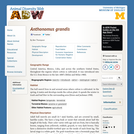
Anthonomus grandis: Information
- Subject:
- Life Science
- Zoology
- Material Type:
- Reading
- Provider:
- University of Michigan Museum of Zoology
- Provider Set:
- Animal Diversity Web
- Author:
- Ben Thompson (author), Southwestern University
- Date Added:
- 03/07/2005

Anthonomus grandis: Information

This is a collection of mini lectures created by anthropologists and those in conversation with anthropology as supplimental material to assist college and university instructors who were made to shift their courses online because of COVID19.For more information, see here.To contribute, please create an OER author account and send your name and OER registered email to AnthropologyTeaching@gmail.com.
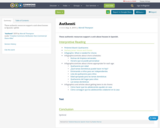
These authentic resources support a unit about houses in Spanish. vgfrbfz
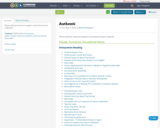
These authentic resources support a unit about houses in Spanish.
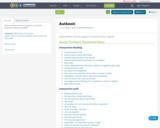
These authentic resources support a unit about housebfs in Spanish. grbfdZB
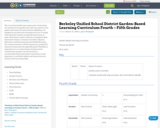
The curriculum builds upon many years of educating our students in the garden and scales up content across grades and lessons for instructional scaffolding. It is designed as an interactive teaching tool to be co-taught with classroom teachers and garden instructors as leads. Each lesson connects directly to standards: Next Generation Science, Common Core State, Physical Education, and Environmental and Health Education. Our concise and easy-to-follow lessons are a packed 45 minutes for preschool through fifth grade. Flexibility is important to us, so some lessons include several activities that teachers can choose from to accommodate their lesson plans. Consistency is also important, so we follow themes and lesson structure found in the Curriculum Map.
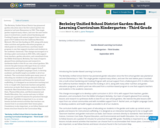
The Berkeley Unified School District has pioneered garden education since the first school garden was planted at LeConte Elementary in 1983. This single garden inspired many others, and over the next twelve years it evolved into a multi-school Gardening and Cooking Program with annual support from a federal grant of $1.9 million from the California Nutrition Network. We lost this funding in 2013, along with many other nutrition and garden education programs, at which point we refocused from a nutrition-based program to one that supports teachers and students in the academic classroom.
This change encouraged us to develop a pilot curriculum in 2013–1014, with support from teachers, garden educators, and consultants from the Edible Schoolyard, Berkeley. Our team of experts gleaned from existing lessons and research to synthesize drafts to best fit our own school gardens. We rewrote the pilot lessons with input from our school communities and with incredible support from P. Rachel Levin, an English Language Coach, to develop academic and health targets accessible to all of our students.
The curriculum builds upon many years of educating our students in the garden and scales up content across grades and lessons for instructional scaffolding. It is designed as an interactive teaching tool to be co-taught with classroom teachers and garden instructors as leads. Each lesson connects directly to standards: Next Generation Science, Common Core State, Physical Education, and Environmental and Health Education. Our concise and easy-to-follow lessons are a packed 45 minutes for preschool through fifth grade. Flexibility is important to us, so some lessons include several activities that teachers can choose from to accommodate their lesson plans. Consistency is also important, so we follow themes and lesson structure found in the Curriculum Map.
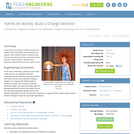
In this hands-on activity, students explore the electrical force that takes place between two objects. Each student builds an electroscope and uses the device to draw conclusions about objects' charge intensity. Students also determine what factors influence electric force.
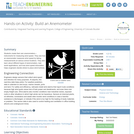
Students create their own anemometers instruments for measuring wind speed. They see how an anemometer measures wind speed by taking measurements at various school locations. They also learn about different types of anemometers, real-world applications, and how wind speed information helps engineers decide where to place wind turbines.
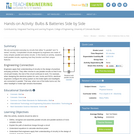
We are surrounded everyday by circuits that utilize "in parallel" and "in series" circuitry. Complicated circuits designed by engineers are made of many simpler parallel and series circuits. In this hands-on activity, students build parallel circuits, exploring how they function and their unique features.
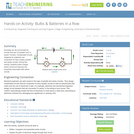
Everyday we are surrounded by circuits that use "in parallel" and "in series" circuitry. Complicated circuits designed by engineers are composed of many simpler parallel and series circuits. During this activity, students build a simple series circuit and discover the properties associated with series circuits.
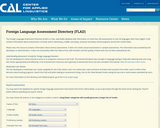
The CAL Oral Proficiency Exam (COPE) measures listening and speaking skills and is offered for various languages, Arabic being one of them. The exam can be administered to students at an intermediate proficiency level in the 5-7th grade. The length of the exam is 15-20 minutes per pair of students.
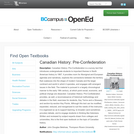
Canadian History: Pre-Confederation is a survey text that introduces undergraduate students to important themes in North American history to 1867. It provides room for Aboriginal and European agendas and narratives, explores the connections between the territory that coalesces into the shape of modern Canada and the larger continent and world in which it operates, and engages with emergent issues in the field. The material is pursued in a largely chronological manner to the early 19th century, at which point social, economic, and political change are dissected. Canadian History: Pre-Confederation provides, as well, a reconnaissance of historical methodology and debates in the field, exercises for students, Key Terms and a Glossary, and section-by-section Key Points. Although this text can be modified, expanded, reduced, and reorganized to suit the needs of the instructor, it is organized so as to support learning, to broaden (and sometimes provoke) debate, and to engage students in thinking like historians. Written and reviewed by subject experts drawn from colleges and universities, this is the first open textbook on the topic of Canadian history.
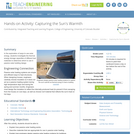
In the exploration of ways to use solar energy, students investigate the thermal energy storage capacities of different test materials to determine which to use in passive solar building design.
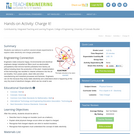
Students use balloons to perform several simple experiments to explore static electricity and charge polarization.
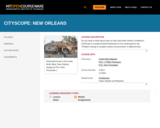
Do you want to think about ways to help solve New Orleans' problems? CityScope is a project-based introduction to the contemporary city. “Problem solving in complex (urban) environments” is different than “solving complex problems.” As a member of a team, you will learn to assess scenarios for the purpose of formulating social, economic and design strategies to provide humane and sustainable solutions. A visit to New Orleans is planned for spring break 2007.

Do you want to think about ways to help solve New Orleans' problems? CityScope is a project-based introduction to the contemporary city. "Problem solving in complex (urban) environments" is different than "solving complex problems." As a member of a team, you will learn to assess scenarios for the purpose of formulating social, economic and design strategies to provide humane and sustainable solutions. A visit to New Orleans is planned for spring break 2007.
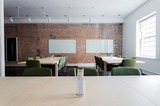
A classroom picture by Pexels found on the site Pixabay. First picture is original. Text has been added as well as a filter to take the photo out of focus. "Bricks Chairs Classroom" by Pexels is licensed under CC BY 4.0 / A derivative from the original workLicense: Creative Commons Attribution

A classroom picture by Pexels found on the site Pixabay. Text has been added as well as a filter to take the photo out of focus. "Bricks Chairs Classroom" by Pexels is licensed under CC BY 4.0 / A derivative from the original workLicense: Creative Commons Attribution
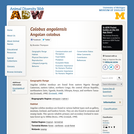
Colobus angolensis: Information